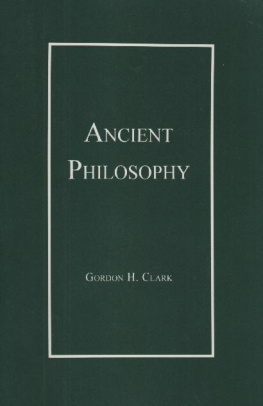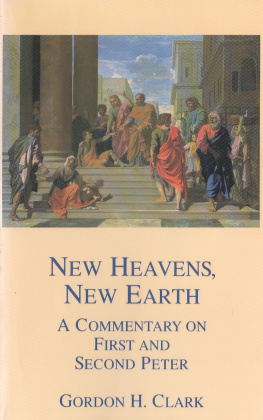Gordon H. Clark - What Is Saving Faith?
Here you can read online Gordon H. Clark - What Is Saving Faith? full text of the book (entire story) in english for free. Download pdf and epub, get meaning, cover and reviews about this ebook. year: 2004, publisher: Trinity Foundation, genre: Religion. Description of the work, (preface) as well as reviews are available. Best literature library LitArk.com created for fans of good reading and offers a wide selection of genres:
Romance novel
Science fiction
Adventure
Detective
Science
History
Home and family
Prose
Art
Politics
Computer
Non-fiction
Religion
Business
Children
Humor
Choose a favorite category and find really read worthwhile books. Enjoy immersion in the world of imagination, feel the emotions of the characters or learn something new for yourself, make an fascinating discovery.
- Book:What Is Saving Faith?
- Author:
- Publisher:Trinity Foundation
- Genre:
- Year:2004
- Rating:4 / 5
- Favourites:Add to favourites
- Your mark:
- 80
- 1
- 2
- 3
- 4
- 5
What Is Saving Faith?: summary, description and annotation
We offer to read an annotation, description, summary or preface (depends on what the author of the book "What Is Saving Faith?" wrote himself). If you haven't found the necessary information about the book — write in the comments, we will try to find it.
What Is Saving Faith? — read online for free the complete book (whole text) full work
Below is the text of the book, divided by pages. System saving the place of the last page read, allows you to conveniently read the book "What Is Saving Faith?" online for free, without having to search again every time where you left off. Put a bookmark, and you can go to the page where you finished reading at any time.
Font size:
Interval:
Bookmark:
To this point the discussion has been centered on the history of the doctrine. The objections to some parts of the various views, though in appearance negative, were, as earlier indicated, actually positive and constructive. Turning now from the historical matrix, the study will try to collect and somewhat organize these previous conclusions. Then, too, although there was a section on Biblical Data, more Biblical data are to be added. To begin with, a relatively non-controversial point will be made, not only to round out the exposition, but also because it leads into a most embarrass- ing puzzle. The thesis is that faith is necessary to salvation.
One difficulty in the doctrine of justification by faith alone has to do with infants and imbeciles. Most Christians believe that some who die in infancy are saved, and many believe that all who die in infancy are saved. But if faith is necessary, and if infants are incapable of believing anything, what happens to Calvinistic theology? The usual answer is to deny that faith is universally necessary and that infants and some others are justified without faith. The Lutherans, however, are more consistent. They hold that infants can exercise faith even before birth. Of course, how they can believe the gospel which they cannot possibly have heard remains a mystery, for the Scripture says. Faith cometh by hear- ing. On the other hand, Lutherans have a powerful point in their favor as they cite the case of John the Baptist, who was filled with the Holy Ghost while yet in his mothers womb.
The anti-christian Supreme Court should consider this when they legalize the murder of babies on the ground that they are not yet human beings.
Be this all as it may, Supreme Court, Calvinism, and Luther- anism, each reader must decide for himself whether the following Biblical passages require the conclusion that faith is a necessity for salvation. And if faith is necessary to salvation, it is necessary for theology also. We must understand what the Scriptures say. The following verses, or at least some of them, seem to teach that faith is necessary. Assuredly they teach more than this, and references to them must later be made in explanation of other phases of the doctrine. But they are given here for the sole purpose of pointing out the necessity of faith.
John 3:15, 16 Everyone who believes in him has everlasting life ... He who believes in him shall not perish.
Acts 16:31 Believe on the Lord Jesus, and thou shalt be saved.
Strictly speaking these two verses do not show that faith is necessary to salvation. They show that faith is sufficient. If some- one believes, he has eternal life. No one is lost who believes. But these two verses, if taken alone, allow for the possibility that something else could be substituted for faith. Suppose I am driving south on Interstate 65, and in Kentucky I come to Cave City. The attendant at the gas station says, If you take routes 9 and 231 you will surely get to MurphreesboroTTrue enough. But it is also true that if I continue on 1-65 and 24 1 shall get to Murphreesboro just as well. Now...
Mark 16:16 He who believes and is baptized shall be saved, but he who does not believe shall be condemned.
teaches not only that faith is sufficient, but also that without faith salvation is impossible. However, since some scholars do not regard this as part of the canon, three other verses follow.
James 3:18 He who believes in him is not judged; he who does not believe is judged already.
James 3:36 He who believes in the Son has eternal life; but he who disobeys the Son shall not see life.
Hebrews 11:6 Without faith it is impossible to please [God].
These verses are sufficiently explicit; but the general doctrine of justification by faith alone is a stronger proof than a few sample verses. The passages on justification may not singly be so explicit:
It is necessary to combine them and draw inferences. But in view of the last half of Romans 3, and for that matter of the last half of Romans 5, the conclusion is the more compelling because the base is broader.
The Trinity Foundation is committed to the reconstruction of philosophy and theology along Biblical lines. We regard Gods command to bring all our thoughts into conformity with Christ very seriously, and the books listed below are designed to accomplish that goal. They are written with two subordinate purposes: (1) to demolish all secular claims to knowledge; and (2) to build a system of truth based upon the Bible alone.
Behaviorism and Christianity, Gordon H. Clark $5.95
Behaviorism is a critique of both secular and religious behaviorists. It includes chapters on John Watson, Edgar S. Singer Jr., Gilbert Ryle, B.F. Skinner, and Donald MacKax Clark's refutation of behaviorism and his argument for a Christian doctrine of man are unanswerable.
A Christian Philosophy of Education, Gordon H. Clark $8.95 The first edition of this book was published in 1946. It sparked the contemporary interest in Christian schools. Dr. Clark has thoroughly revised and updated it, and it is needed now more than ever. Its chapters include: The Need for a World-View, The Christian World-View, The Altemath'e to Christian Theism, Neutrality, Ethics, The Christian
Philosophy of Education, Academic Matters, Kindergarten to University. Three appendices are included as well: The Relationship of Public Education to Christianity, A Protestant World-View, and Art and the Gospel
A Christian View of Men and Things, Gordon H. Clark $8.95 No other book achieves what A Christian View does: the presentation of Christianity as it applies to history politics, ethics, science, religion, and epistemology. Clarks command of both worldly philosophy and Scripture is evident on every page, and the result is a breathtaking and invigorating challenge to the wisdom of this world
Dr. Clark chides some of his critics for their failure to defend Christianity competently Clark Speaks is a stimulating and illuminating discussion of the errors of contemporary apologists.
Dewey has had an immense influence on American philosophy and education. His irrationalism, the effects of which we can see in government education, is thoroughly criticized by Clark
J. Gresham Machen
Machen was one of the foremost educators, theologians, and defenders of Christianity in the twentieth century The author of numerous scholarly books, Machen saw clearly that if Christianity is to survive and flourish, a system of Christian grade schools must be established This collection of essays captures his thought on education over nearly three decades.
John W. Robbins, editor
Friends of Dr. Clark have written their recollections of the man. Contributors include family members, colleagues, students, and friends such as Harold Lindsell Carl Henry, Ronald Nash, Dwight Zeller, and Mary Crumpacker. The book includes an extensive bibliography of Clark's work
Logic, Gordon H. Clark $8.95
Written as a textbook for Christian schools, Logic is another unique book from Clarks pen. His presentation of the laws of thought, which must be followed if Scripture is to be understood correctly, and which are found in Scripture itself, is both clear and thorough. Logic is an indispensable book for the thinking Christian.
Gordon H. Clark
In opposing the contemporary idolatry of science, Clark analyzes three major aspects of science: the problem of motion, Newtonian science, and modem theories of physics. His conclusion is that science, while it may be useful, is always false; and he demonstrates its falsity in numerous ways. Since science is always false, it can offer no objection to the Bible and Christianity
Font size:
Interval:
Bookmark:
Similar books «What Is Saving Faith?»
Look at similar books to What Is Saving Faith?. We have selected literature similar in name and meaning in the hope of providing readers with more options to find new, interesting, not yet read works.
Discussion, reviews of the book What Is Saving Faith? and just readers' own opinions. Leave your comments, write what you think about the work, its meaning or the main characters. Specify what exactly you liked and what you didn't like, and why you think so.













